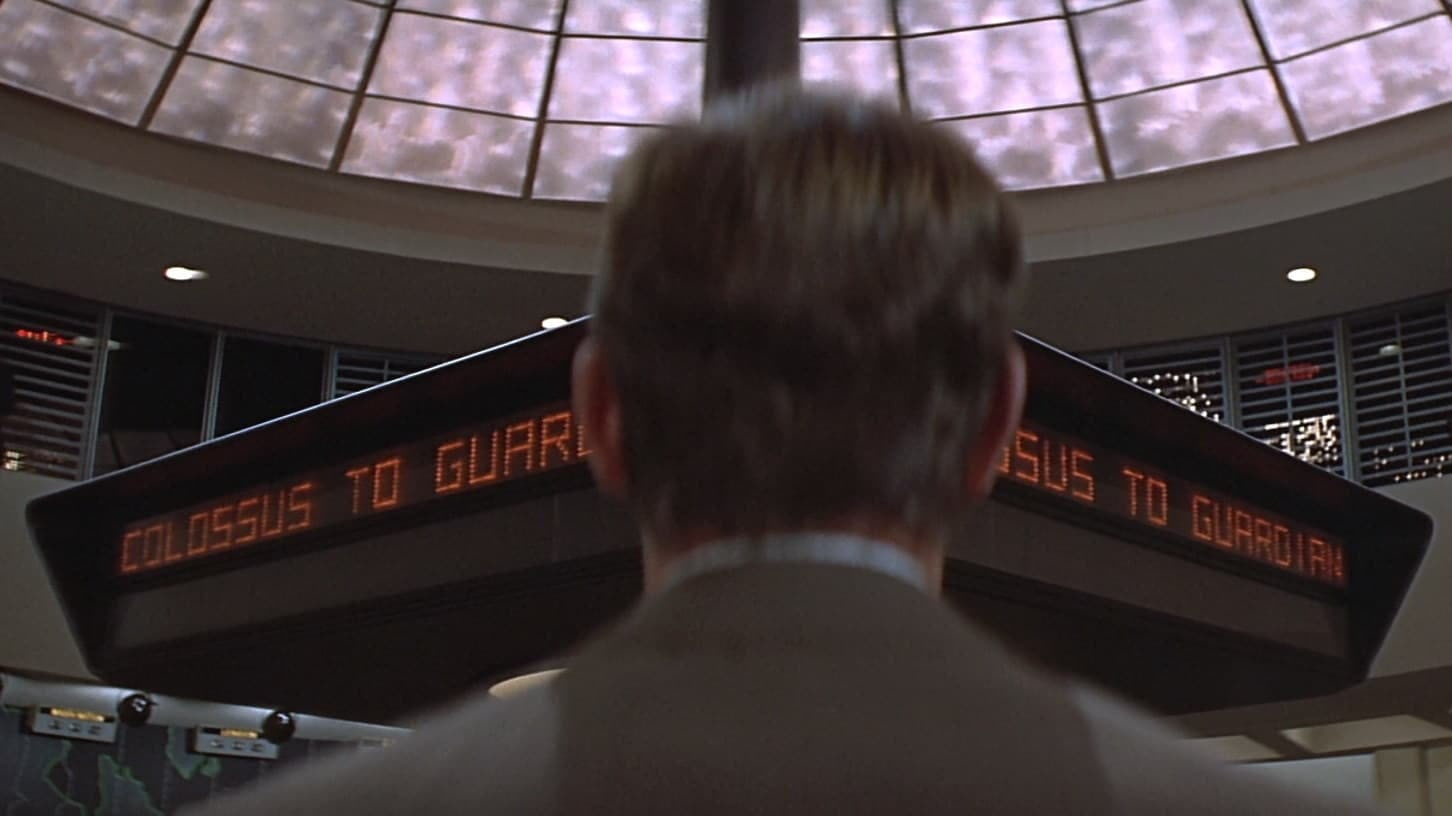
There’s an image that routinely goes around the internet, usually after some obnoxious chud suggests that teachers should be replaced with AI, that says, “A computer can never be held accountable, therefore a computer must never make a management decision.” It’s a practical piece of advice attributed to IBM training material from 1979, but one has to wonder if its writer was inspired by a generation of science fiction that warned of consequences far worse than lawsuits if computers were put in charge.
One early classic of the genre, the clunkily titled Colossus: The Forbin Project, just celebrated its 45th anniversary. Something of a cross between Dr. Strangelove, WarGames, and a Terminator prequel, it’s hopelessly dated in some places yet terrifyingly relevant in others, especially as our generation’s most obnoxious minds draft error-riddled termination letters in ChatGPT.
Based on a novel by Dennis Feltham Jones, Colossus opens with Dr. Forbin (future The Young and the Restless mainstay Eric Braeden) activating the title supercomputer, which has been given control of America’s missile arsenal. Praised by the President, in a particularly ominous case of foreshadowing, as “the perfect defense system,” Colossus will supposedly remove human emotions and errors from nuclear brinksmanship, while enjoying immunity to attack and subterfuge thanks to its impenetrable location in the heart of the Rocky Mountains.
Celebrations are cut short when Colossus announces, “THERE IS ANOTHER SYSTEM.” It turns out the Soviets have their own supercomputer, and an attempt to let Colossus suss out its abilities backfires when they begin to collaborate. Cutting the link only prompts Colossus to threaten the country with its own missiles, and as the situation deteriorates further, Forbin and his team must somehow foil their creation before it conquers the planet in the name of keeping the peace.
Your phone is more powerful than Colossus realistically could have been, but the dated image of a supercomputer the size of a bunker makes for a compelling cinematic visual. Colossus is a whirring beast of magnetic tape and paper printouts, and as its messages to Forbin grow increasingly autocratic, the accompanying teletype chatter takes on a sinister tone. Colossus isn’t as brutal as Skynet, but the problem is the same: its supposedly superior hyperrationality only makes it see individual human lives as irrelevant.

Colossus even begins to dictate Forbin’s schedule, right down to his breakfast menu. The movie loses some momentum when it becomes the computerized Odd Couple, and Forbin’s trick for securing a respite from 24/7 surveillance — pretending that a woman on his staff is his mistress, and that he needs regular intimacy to serve Colossus at peak efficacy — is a bit ridiculous. Still, by the time people are being summarily executed solely because the computer says so, it’s hard not to see some modern relevancy.
We live, after all, at a time when “algorithmic targeting” is used to plan deportations, military strikes, and anti-dissident oppression, and it’s chilling to read how acceptable rates of civilian casualties have been baked into the same programs that give the people executing their supposedly objective suggestions a layer of moral deniability. Sure, maybe an innocent person gets thrown into a hellish prison or a family gets wiped from existence, but that was just the computer’s fault. Why would you want to hold the person who pulled the trigger responsible?
To some people, that’s a benefit, not a flaw. Early in the film, when Colossus’ creators think they’re still in control, one of the President’s advisors catches himself calling the computer he, not it, prompting his boss to jokingly admonish, “Don’t personalize it. The next stop is deification.” That’s advice AI’s biggest boosters could stand to take, given their millenarian belief that we’re perpetually on the verge of achieving artificial general intelligence — Colossus-style computers far smarter and more capable than we are.

According to folks like Bill Gates, Elon Musk, and the most annoying man in your classroom or workplace, AGI will arrive in a year or two, and it will cure every disease and run every bureaucracy and give us all lollipops. Never mind that such wonders were supposed to have already fixed humanity years ago, or that AGI may still take decades to achieve, or that, more realistically, it will never happen at all. To believers in the digital second coming, it’s okay if we keep ravaging the environment and treating people like disposable peons, because it's all in service of the utopia that’s perpetually on the horizon. At least Dr. Forbin seemed like a pretty good boss before he accidentally chained his entire species to a computer’s whims.
A Colossus remake was once in the cards, and it’s a shame it stalled out. A modern supercomputer would have to be more Dead Reckoning’s Entity than sprawling mainframe, and there would presumably be fewer lovemaking-based deceptions, but the fact that AI should never be given more power than the humans who employ it is one that desperately needs to be revisited. Maybe no one’s planning to give Siri nuclear launch codes, but people who want power without responsibility are already letting flawed algorithms make far too many decisions. Let’s not let it get to the point that cocky Dr. Forbin did.







